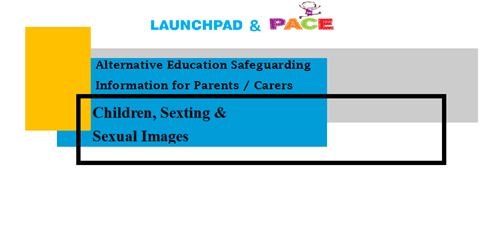Children, Sexting and Sexual Images

Sharing information online is now part of everyday life. Digital devices can capture, store and share personal information in an instant. We are all at risk of oversharing personal and private information but none more so than children. Children are at risk of sharing too much personal information with strangers and with other children. Most children use the internet to explore social and personal relationships safely, but it is all too easy to be put at risk.
What is Sexting?
The term ‘Sexting’ means different things to different groups of people but Sexting is risky and is a Safeguarding concern. Sexting is the use of digital technology to record and send sexual photos, images, videos as well as text messages, with others online. Children are often unaware of the law, risks, dangers and consequences of Sexting. Sexting can happen between adults and children but also amongst children themselves.
Where and how does Sexting take place?
Sexual images and messages are shared using the internet on free social media apps (Facebook, Snapchat, Instagram, Kik, Yik Yak, Ask.fm) messaging apps, text messaging which also allows images to be sent, online chatrooms, online gaming chatrooms and message boards and Email. Sexting can be anonymous or can involve online ‘friends’. Images can be shared publically for all to see or sent ‘privately’. Once an image has been sent all control of it is lost.
Why do children ‘Sext’?
Children have a natural curiosity about sex and sexuality and use digital technology to explore these relationships. Although likely to be undertaken innocently and through misadventure, children increase the risks to their personal safety and unknowingly break the laws which are there to protect them. It is important to support, educate and Safeguard children in order to prevent issues or to help them deal with the consequences of Sexting.
Other reasons for this behaviour may include:
- Having a bit of fun which can quickly turn into something riskier and more dangerous.
- To gain attention and reaction online and to make and keep an online friendship.
- They have made a choice to share images of themselves or may have been told or asked to do so.
The Law, Sexual Images and Children
It is illegal to make, possess and share sexual images, photos and videos of a person under the age of 18. This also includes any sexual images, photos and videos that your child may have taken of themselves if they are under age.
It can be complicated to respond appropriately when children are involved in sharing sexual images with other children and each instance will be different. In doing this, they are breaking the law and an appropriate and measured response is required.
It is important that care is taken not to unnecessarily criminalise children who are involved in taking, keeping and sharing sexual images but action must be taken. The consequences can remain with them for the rest of their lives and may impact directly upon their future. When responding to children sharing sexual images with other children, the police may become involved and will assess each case accordingly within the law. They are required to register this type of incident as a ‘crime’ but have powers which allow them to use discretion in how each incident is handled.
Tips on preventing Sexting
It can be a difficult topic to discuss with your child without seeming that you are prying, in fact you are parenting!
- Start by simply asking them to talk you through the sorts of things they do using their digital device, encourage them to explain the sorts of things they share, with who and how.
- Educate yourself, find out what social media apps they use and find out what can be done on them, some do not allow photographs to be sent whereas others enable the user to put a time limit on messages before they disappear from the screen (except they don’t really ever disappear if a screenshot is taken and misused) .
- Educate your child by talking to them about what Sexting is and what they can do to protect themselves (encourage your child to think about what they share with others and who might see it online).
- Explain their responsibilities when online, the law and the consequences of Sexting.
What to do in response to Sexting
- As shocking as it may be, offer them reassurance and your total support. They are likely to be embarrassed, upset and perhaps disgusted by what has happened. You finding out will not be easy for them to deal with along with the stress of an already difficult situation.
- Keep the images on the device and do not look at them. This can be difficult as viewing them can sometimes be the only way for you to decide what to do or your child may have shown you without warning.
- Remove the device from your child, switch it off and store it securely until it can be handed over, if needed.
- Be proactive and seek the support of your child’s school, they will have Child Protection and Safeguarding procedures to follow, particularly if it involves other children from the same school. If it involves unknown children and or adults, report the incident to the police and speak to your child’s school. This could be a wider problem and happening to other children. If you are not sure, contact the police directly by visiting a police station or by dialling 101 and speak to a call handler who will be able to help you.
Realistic consequences of Sexting and sharing Sexual Imagery
- Legal consequences will include police involvement and perhaps a formal sanction/punishment.
- If the police are involved the incident will be recorded as a ‘crime’ - this is not a Criminal Record but may have an impact on your child’s future.
- Confiscation of digital technology.
- Blackmail – images and messages can be stored easily on digital devices leaving the sender vulnerable to manipulation and threats.
- Bullying – Your child may become the victim of bullying or use images to bully other children.
- Cyberbullying – Your child may experience online hate or create this for others.
- Sexual exploitation – Your child is at risk of becoming a target for other online predators.
- Loss of friendship and personal relationships – Your child may find it difficult to make and keep friends.
- Loss of control - once they have been sent they can be shared easily with the sender having no control as to what happens to them. Images can be changed and edited and shared with a wider audience.
- Sexting can have long and far reaching consequences not only f or those directly involved but also for friends and family members who are aware of the situation.
- Physiological effects can include anxiety, depression, suicidal thoughts, self -harm, humiliation, embarrassment, a lack of trust, self -confidence and esteem, difficulty forming and maintaining friendships and relationships.





